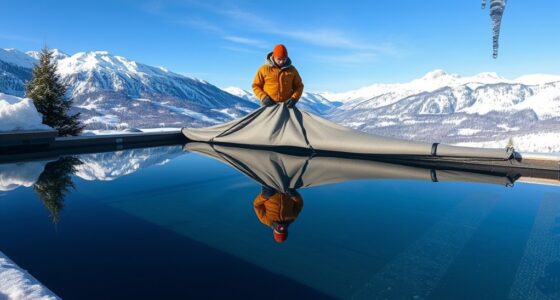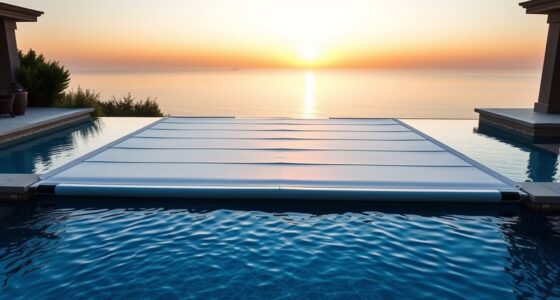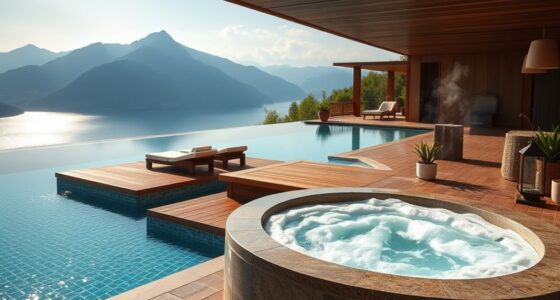Choosing between an indoor infinity pool and an outdoor one depends on what you prioritize. Indoor pools give you year-round comfort, precise temperature control, and more design flexibility, but they come with higher costs and energy use. Outdoor pools provide scenic views, natural sunlight, and a relaxing environment, yet weather limits their use. Understanding these factors helps you make the best choice for your space and lifestyle—keep exploring for a detailed comparison.
Key Takeaways
- Indoor infinity pools offer climate control for year-round use, while outdoor pools depend on seasonal weather conditions.
- Outdoor pools provide scenic natural views that change with the seasons, unlike the customizable indoor environment.
- Indoor pools typically require higher energy and maintenance costs due to climate control and ventilation systems.
- Outdoor pools are more susceptible to weather disruptions and debris, affecting usability and cleanliness.
- Indoor pools ensure privacy and security, whereas outdoor pools may benefit from natural landscaping and scenic surroundings.
Climate Control and Comfort

Indoor pools offer superior climate control, allowing you to enjoy a consistently comfortable environment regardless of outdoor weather conditions. You won’t have to worry about extreme heat, cold, rain, or wind disrupting your swim. The temperature can be precisely regulated to match your preference, creating a cozy or invigorating atmosphere as needed. Ventilation systems help keep the air clear and humidity levels balanced, preventing stuffiness or mustiness. This controlled environment means you can swim any time of the year without concern for seasonal changes. Plus, you won’t need to dress in multiple layers or bring extra gear to combat outdoor elements. Indoor pools provide a stable, inviting space where comfort is optimized, ensuring your swimming experience remains enjoyable no matter what’s happening outside. Additionally, climate control features contribute to a safer environment by reducing the risks associated with temperature fluctuations and humidity-related issues.
Visual Appeal and Scenic Views
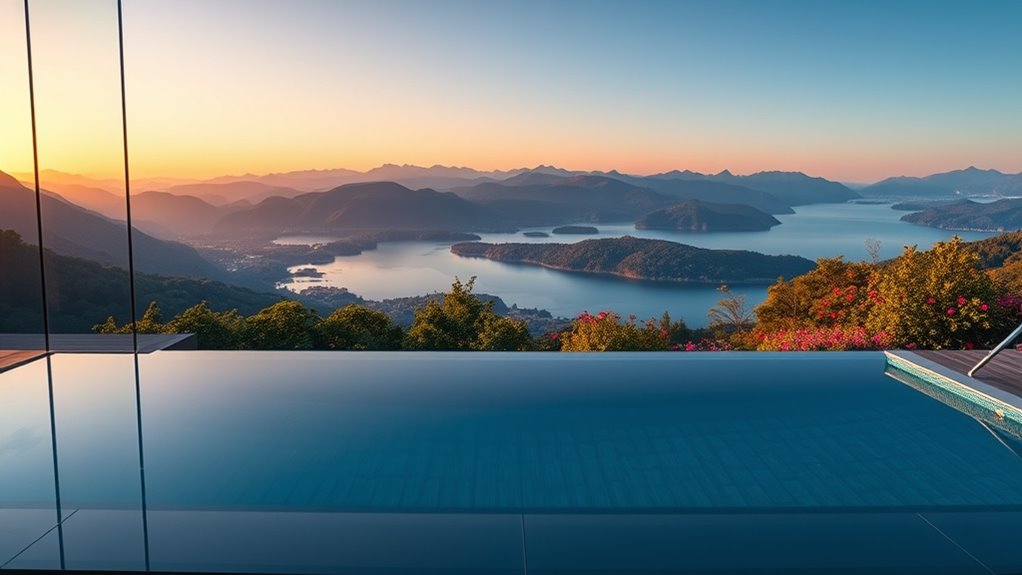
With an indoor infinity pool, you enjoy abundant natural light that highlights the pool’s stunning features and creates a bright, inviting atmosphere. You also have the advantage of controlling the aesthetic environment, ensuring the surroundings always match your style. Outdoor pools, on the other hand, offer scenic views of nature that change with the seasons, adding a dynamic visual appeal. Advances in immersive technology are making outdoor settings even more captivating by integrating virtual enhancements into natural environments.
Natural Light Advantage
Natural light pouring into an outdoor pool dramatically enhances its visual appeal, creating a bright, inviting atmosphere that’s hard to replicate indoors. Sunlight reflects off the water, highlighting its crystal-clear surface and the surrounding scenery. This natural illumination elevates your experience, making every swim feel more vibrant and alive. The scenic views become part of the pool’s charm, immersing you in nature’s beauty. Imagine lounging poolside as sunlight dances on the water, or gazing at a sunset’s warm glow. The aesthetic appeal of outdoor pools often surpasses that of indoor ones, especially in good weather. Below is a table capturing the emotional impact:
| Emotion | Visual Effect | Experience |
|---|---|---|
| Serenity | Gentle sunlight filtering through | Relaxing and peaceful |
| Excitement | Sparkling water under bright sun | Energizing and uplifting |
| Awe | Scenic views with sunlight | Inspiring connection with nature |
| Joy | Warm sunlight on your skin | Uplifting mood |
| Tranquility | Calm reflections and soft light | Deep sense of calm |
Controlled Aesthetic Environment
While natural light can be unpredictable outdoors, an indoor infinity pool offers a carefully curated aesthetic environment that enhances its visual appeal. You control the lighting, decor, and ambiance, creating a consistently beautiful setting. This means you can tailor the surroundings to match your mood or style, whether that’s sleek modernity or cozy elegance. The enclosed space also minimizes external distractions, allowing you to focus on the pool’s stunning design and the mesmerizing water flow. Scenic views are not limited by weather or time of day, giving you a seamless, picturesque backdrop whenever you desire. With a controlled environment, your pool becomes a private oasis, where every detail is designed to elevate your visual experience and make your space uniquely yours. Customer service can also assist with any questions about customizing your indoor pool environment.
Maintenance and Upkeep
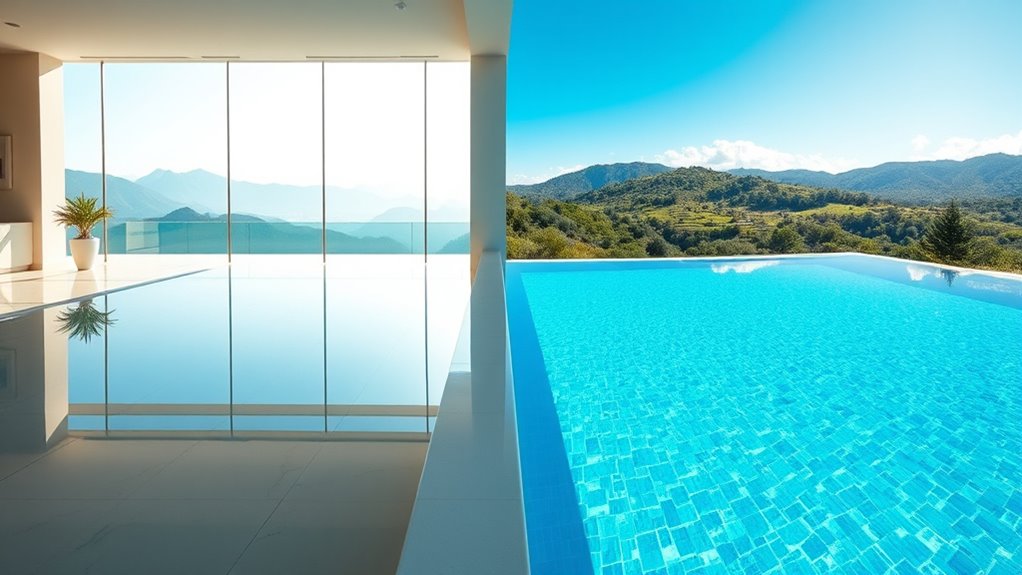
Maintaining an indoor infinity pool generally requires less effort in regards to environmental control, but it still demands regular attention to keep the water clean and balanced. You’ll need to test and adjust the pH, alkalinity, and sanitizer levels weekly to prevent algae growth and bacteria. Regularly cleaning the filters ensures proper circulation and water clarity. Since the pool is indoors, you’re protected from debris, but dust and dirt can still accumulate, so skimming the surface and vacuuming the floor is essential. Keep an eye on the equipment for leaks or malfunctions, and schedule periodic professional inspections for the pump and heater. Overall, upkeep is more predictable indoors, but consistent maintenance is key to ensuring your pool remains inviting and safe. Incorporating proper water treatment methods like glycolic acid can help maintain clear and smooth water surfaces.
Privacy and Security

Indoor infinity pools offer a higher level of privacy and security compared to outdoor options. With an indoor pool, you can enjoy your swim without worrying about neighbors, passersby, or weather interruptions. Your space remains secluded, reducing the risk of unwanted visitors or intrusions. Additionally, controlled access and security features like alarms or cameras can be easily integrated. To clarify, consider this table:
| Aspect | Benefits |
|---|---|
| Privacy | No external view, controlled access |
| Security | Restricted entry, surveillance options |
| Environmental Control | Weather protection, consistent safety measures |
This setup ensures your privacy stays intact and your security is prioritized, giving you peace of mind during every swim. Implementing security measures such as surveillance can also help maintain color accuracy and overall safety.
Cost Considerations

Investing in an indoor infinity pool involves significant upfront and ongoing costs that should be carefully considered. Building an indoor pool requires substantial expenses for construction, specialized ventilation, heating, and humidity control systems. These elements ensure a comfortable environment but add to the overall price. Maintenance costs are also higher for indoor pools due to the need for constant air filtration and humidity management to prevent mold and structural damage. Additionally, energy bills can be substantial since heating and ventilation systems run frequently. Proper indoor pool ventilation is essential to maintain air quality and prevent issues like mold growth, which can increase maintenance complexity and costs. While an outdoor pool might seem less costly initially, consider the long-term expenses related to weather-related wear and tear, chemicals, and regular upkeep. Make sure your budget accounts for both the initial investment and ongoing operational costs before making a decision.
Accessibility and Convenience

When it comes to accessibility and convenience, indoor pools offer a significant advantage because you can enjoy swimming regardless of the weather or time of day. Rain, snow, or extreme heat won’t interrupt your plans, making spontaneous dips easy. Indoor pools are often located closer to your home or within shared facilities, reducing travel time and effort. You don’t need to worry about outdoor hazards like insects, debris, or uneven surfaces. Plus, indoor environments typically have controlled temperatures, so your comfort is maintained year-round. This controlled environment ensures a more comfortable and consistent swimming experience. This convenience means you can fit in a swim whenever it suits your schedule, without planning around weather conditions. Overall, indoor pools provide a more reliable and hassle-free experience, making them a practical choice for regular use.
Seasonal Use and Weather Dependence
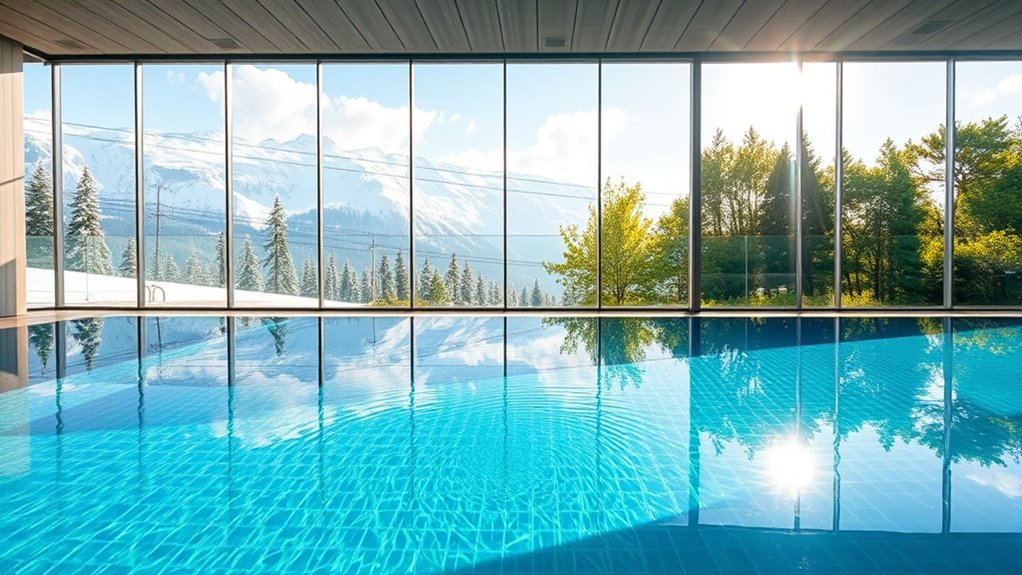
While indoor pools are accessible year-round regardless of weather, outdoor pools are heavily affected by seasonal changes. During colder months, you’ll find outdoor pools less inviting unless they have heating systems, which can be costly. Rain, snow, or high winds may force you to skip swimming altogether, especially if safety becomes a concern. Summer offers the best opportunity for outdoor use, but unpredictable weather can still disrupt plans. Conversely, indoor pools provide consistent use without weather limitations, allowing you to swim whenever you want. This makes indoor pools more reliable for regular exercise or relaxation. However, outdoor pools’ reliance on favorable weather means you may have to adjust your schedule or wait for suitable conditions, limiting year-round enjoyment. Additionally, outdoor pools often offer scenic views that enhance the swimming experience, but these are only appreciated during good weather.
Space and Design Flexibility
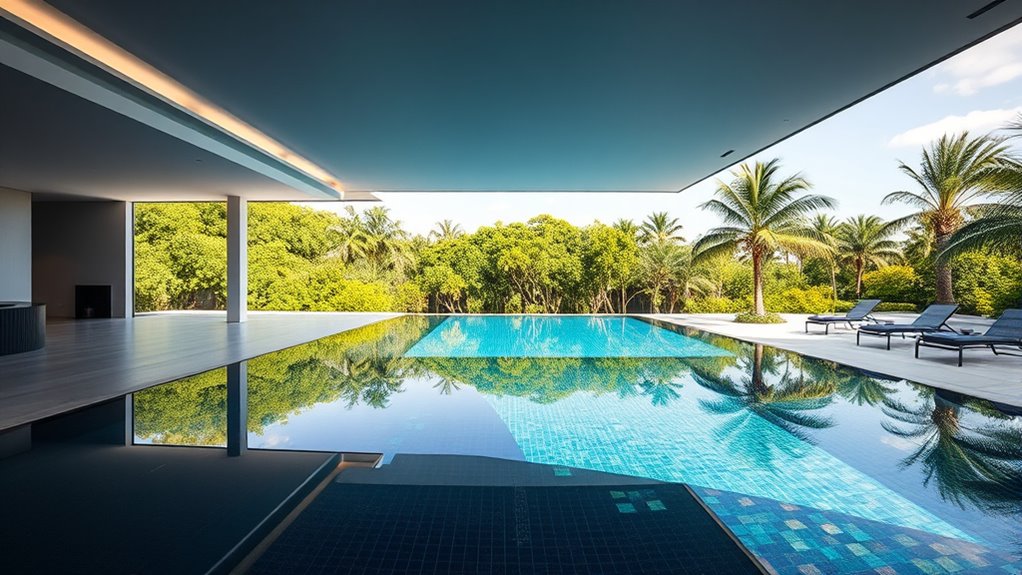
Indoor pools offer unparalleled flexibility in space and design, allowing you to customize the environment to fit your specific needs. You can choose the size, shape, and layout that best suits your preferences, whether you want a sleek, modern design or a more traditional look. With indoor pools, you’re not limited by outdoor space constraints, so you can incorporate features like waterfalls, lighting, or seating areas that enhance your experience. Additionally, you can integrate the pool seamlessly into your existing home design, creating a cohesive aesthetic. This level of control means you can adapt the pool to fit your lifestyle, whether for relaxation, exercise, or entertaining guests. Moreover, maintenance requirements are often more manageable indoors due to controlled climate conditions. Overall, indoor pools give you the freedom to craft a personalized aquatic space that aligns perfectly with your vision.
Environmental Impact and Sustainability

Choosing between indoor and outdoor pools also involves considering their environmental impact and sustainability. Indoor pools typically require more energy for heating and ventilation, increasing their carbon footprint. Conversely, outdoor pools benefit from natural sunlight and air, reducing energy consumption but may need chemical treatments that can harm the environment. To minimize environmental impact, consider these factors:
- Using energy-efficient heating systems
- Installing solar panels for sustainable power
- Choosing eco-friendly pool chemicals
- Incorporating rainwater collection for maintenance
- Using natural landscaping to reduce runoff and chemical use
Both options have sustainability challenges, but smart choices can lessen their impact. Indoor pools may need more energy, while outdoor pools require eco-conscious maintenance practices. Your goal should be to balance comfort with environmental responsibility.
Integration With Home and Landscaping
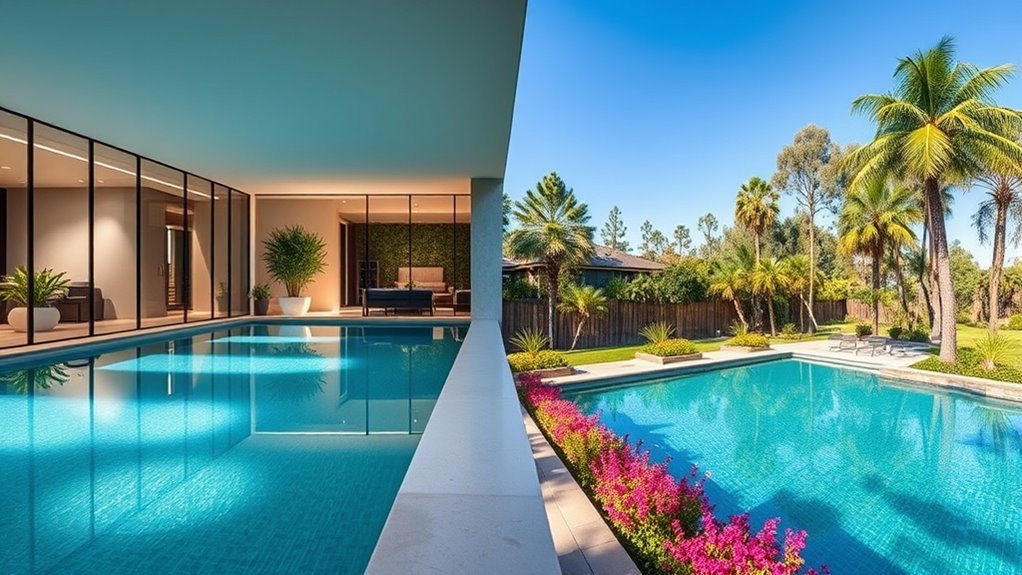
Integrating your pool seamlessly with your home and landscape enhances both functionality and aesthetic appeal. For an indoor infinity pool, you can create a sleek, cohesive look by matching materials and colors with your interior design. Large windows or glass walls blend the pool with outdoor views, making it feel like part of your landscape. Outdoor pools, on the other hand, allow you to design around natural elements such as gardens, trees, and patios, making the space more inviting. Proper landscaping can soften the pool’s edges and provide privacy, while thoughtful placement guarantees easy access from your home. Whichever option you choose, integrating the pool thoughtfully ensures it complements your overall property, elevates your outdoor living, and creates a harmonious environment.
Frequently Asked Questions
Which Type of Pool Has Higher Long-Term Energy Costs?
Outdoor pools generally have higher long-term energy costs because they lose more heat and require more heating to maintain water temperature, especially in colder climates. Indoor pools benefit from a controlled environment, reducing heat loss and energy use. However, indoor pools may incur higher costs for ventilation and air quality systems. Overall, outdoor pools tend to be more expensive to operate over time due to increased heating needs.
How Do Indoor Pools Affect Indoor Air Quality?
In the blink of an eye, indoor pools can negatively impact your indoor air quality. The humidity from the water creates a perfect environment for mold, bacteria, and airborne pollutants, which can lead to respiratory issues or allergies. Proper ventilation and dehumidification are essential to keep the air clean and safe. Without these measures, you might find your home’s air quality deteriorates, making it uncomfortable or unhealthy to breathe, much like a foggy London morning.
Are Outdoor Pools More Vulnerable to Weather Damage?
Yes, outdoor pools are more vulnerable to weather damage. Harsh weather conditions like storms, heavy rain, snow, and strong winds can cause structural damage, wear down surfaces, and lead to debris clogging filters. You’ll need to perform regular maintenance and covers to protect your outdoor pool. Indoor pools, on the other hand, are shielded from weather elements, reducing the risk of damage and making upkeep easier in this regard.
Can Indoor Pools Increase Humidity Levels Indoors?
Absolutely, indoor pools can turn your entire space into a humid paradise or a swampy nightmare if not properly ventilated. The constant evaporation from the water creates a humid environment that can lead to mold, mildew, and damage to your home’s structure. You’ll need powerful exhaust fans, dehumidifiers, and good airflow to keep humidity levels in check, ensuring your indoor oasis remains fresh, comfortable, and damage-free.
Which Pool Type Offers Better Resale Value for Homes?
An outdoor pool generally offers better resale value because it appeals to a broader range of buyers and enhances your home’s curb appeal. However, an indoor infinity pool can boost luxury appeal and year-round use, which some buyers find attractive. Ultimately, your local market and buyer preferences influence value. If you want maximum resale potential, an outdoor pool often wins, but an indoor infinity pool adds unique, luxurious appeal that can also increase your home’s worth.
Conclusion
So, whether you choose an indoor infinity pool for year-round luxury or go outdoor for that breathtaking view, remember: it’s all about what fits your lifestyle — and your budget’s sense of humor. Sure, indoor pools keep the weather at bay, but who needs sunshine when you’ve got climate control? Just don’t forget to invite friends or risk turning your splash zone into a lonely oasis. Happy swimming, rain or shine!


